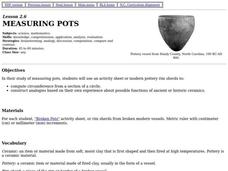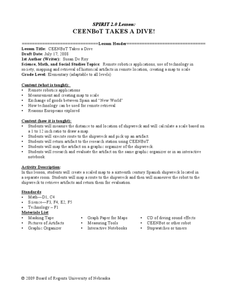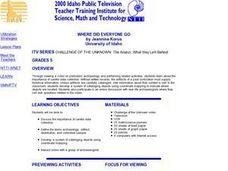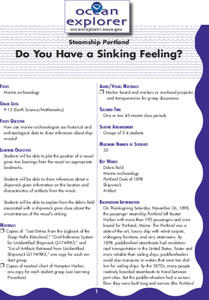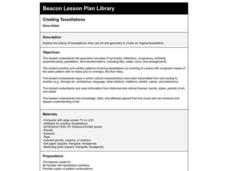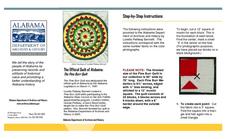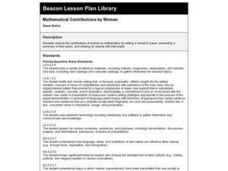Curated OER
Methods of Mystery
Students utilize the scientific method to discover the age of an item. For this historical dating lesson, students compare and contrast a 400 year old cabinet to one made within a few years by using carbon dating. Students...
Curated OER
"how To Think Like an Archaeologist" Suggested Pre-visit Activity for Historic Jamestowne
Young scholars study grocery receipts to simulate the archaeological activity of classifying items. They discuss the receipts as if they were find lists.
Curated OER
Do You Have a Sinking Feeling
Students determine how marine archaeologists use historical and archaeological data to draw inferences about shipwrecks. Students plot the position of a shipwrecked vessel, and draw inferences about the shipwreck from artifacts that have...
Curated OER
Measuring Pots
Students use an activity sheet to construct analogies about possible function of ancient or historic ceramics and compute circumference from a section of a circle as they study measuring pots.
Curated OER
"Adding It Up" at James Fort
Students discuss jettons and their archaeological importance at Jamestown. They then practice using historic counting sheets and artifacts to understand the calculating methods of the early 17th Century, and identify their similarities...
Curated OER
Dressing in Early American Times
Fifth graders, by doing research and seeing actual and simulated artifacts, gain knowledge of and make comparisons about clothing in the Colonial and early Republican eras with attire of present time.
Curated OER
CEENBoT Takes a Dive
Learners create a map to scale using technology. In this algebra activity, students navigate through a shipwreck to perform rescues. They use he CEENBoT program to perform the different tasks.
Curated OER
Daily Life in the Fur Trade: Communications & Resourcefulness
Student complete a number of activities using computer based resources and primary sources to research the fur trade. They answer questions using the computer research.
Curated OER
Everything was Up to Date in 1628
Students examine the life and lifestyles of New England colonists in the year 1628, and then investigate what life was like in their own area during the same time period. They watch segments from the PBS hands-on history series COLONIAL...
Curated OER
Memories to Last: Observing Monuments
Students use scientific observation and inference to examine the Hazen Brigade Monument. In this observation lesson, students review the reasons for building monuments in society. Students then recall monuments they have seen and...
Curated OER
Where Did Everyone Go?
Fifth graders view a video, and perform related activities on prehistoric archaeology to gain an understanding about the importance of careful data collection. They develop a system of cataloging objects using coordinate mapping to...
Curated OER
Do You Have A Sinking Feeling?
Students plot the positions of vessels given bearings in the form of landmarks. They explain how the debris field can help solve the mystery in how the ship sunk.
Curated OER
Creating Tessellations
Third graders explore the history of tessellations; then use art and geometry to create an original tessellation.
Curated OER
The Official Quilt of Alabama- The Pine Burr Quilt
In this quilting worksheet, students follow the directions to re-create the official quilt of Alabama, The Pine Burr Quilt. They use geometric shapes and stitching directions to make quilt squares.
Curated OER
Fly, Fly Away
Students use materials from their own environment to design a kite. For this kite design lesson, students research the history of kites and obtain a formal mathematical definition of a kite. Students sketch kite designs after discovering...
Curated OER
Lesson Plan: The Math of Removal
Students consider the plight of those who walked the Trial of Tears. In this Indian Removal lesson, students compare statistics regarding Indian survival rates.
Curated OER
Mathematical Contributions By Women
Third graders explore the contributions of women to mathematics by writing a research paper, presenting a summary to their peers, and sharing an activity with their peers. They use a variety of reference materials to gather information...



